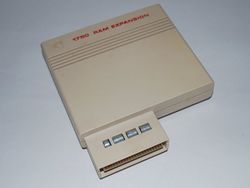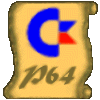Category:REU RAM Expansion Units: Difference between revisions
Count Zero (talk | contribs) mNo edit summary |
Count Zero (talk | contribs) mNo edit summary |
||
| Line 1: | Line 1: | ||
__NOTOC__ | __NOTOC__ | ||
''RAM Expansion | {{Infobox | ||
|image = [[File:1750 REU top.jpg|250px|alt=1750 REU]] | |||
|imagestyle = | |||
|headerstyle = background:#ccf; | |||
|labelstyle = background:#ddf; | |||
|datastyle = | |||
|caption = 1750 REU | |||
|captionstyle = | |||
|header1 = Technical Info | |||
|label1 = | |||
|data1 = | |||
|header2 = | |||
|label2 = RAM | |||
|data2 = 128 - 2048 kbyte originally | |||
|header3 = | |||
|label3 = ROM | |||
|data3 = ''None'' | |||
|header4 = | |||
|label4 = Hardware features | |||
|data4 = ''DMA'' | |||
|header5 = | |||
|label5 = Manual | |||
|data5 = [[:Media:Epyx_FastLoad_Manual.pdf|PDF: Epyx FastLoad Manual]]<br> | |||
[[Epyx FastLoad Manual Project64.txt]] | |||
|header6 = | |||
|label6 = [[CRT ID]] | |||
|data6 = ''-105'' (VICE only) | |||
}} | |||
''RAM Expansion Units'' also known as '''REU''' were initially produced and sold by Commodore. This rather popular device is well covered on the net currently and also emulated in software and hardware (e.g. by the [[1541 Ultimate]]) pretty well. The large Commodore version was followed by a CLD version and the CMD clones which all used a CSG8726 as controller chip also called ''REC''. There are apparently two mounting case forms of the ''REC''. The square one is said to be more common. | |||
The ''REU'' is capable of initiating DMA transfers on request allowing storing, fetching and swapping memory with the C64 main memory. While the C64 is not able to natively access the ''REU'' additional memory and programs need to utilise it especially the ''REU'' DMA is able to transfer memory extremely quick | The ''REU'' is capable of initiating DMA transfers on request allowing storing, fetching and swapping memory with the C64 main memory. While the C64 is not able to natively access the ''REU'' additional memory and programs need to utilise it especially the ''REU'' DMA is able to transfer memory extremely quick. | ||
So far 128, 256, 512, 1024, 2048 and 16384 kb (yes, that's 16MB using a ''1541u'') were spotted at the expansion port | So far 128, 256, 512, 1024, 2048 and 16384 kb (yes, that's 16MB using a ''1541u'') were spotted at the expansion port but the sold devices usually went by an obscure numbering representing the RAM size: | ||
The ''REU'' is using up all of the | * 1700 REU = 128 kbyte | ||
* 1764 REU = 256 kbyte | |||
* 1750 REU = 512 kbyte | |||
The (usually 1750) clones are often smaller and match the size of a common cartridge while keeping the 512 kbyte RAM. These ''REU''s are also consuming a little less power from the C64 expansion port and are better to handle. | |||
The ''REU'' is using up all of the I/O-2 area from $DF00 - $DF0F and is mirroring that register range each $20 bytes. Cartridges operating at $DF00 will collide with the ''REU''. Known to work in parallel using a [[port expander]] are [[Retro Replay]] when using a ROM supporting the REU memory configuration and [[Super Snapshot]] while [[Expert Cartridge]] and [[:Category:Kernal ROM|Kernel ROM]] replacements (incl. [[ExOS]] and [[StarDOS]] cartridges) should work as well. | |||
==Emulation== | ==Emulation== | ||
Unfortunately emulation on several emulators yields problems in combination with common cartridges and other I/O devices but should work ok as standalone cartridge. Results may vary here. | Unfortunately emulation on several emulators yields problems in combination with common cartridges and other I/O devices but should work ok as standalone cartridge and usually allows defining the ''REU'' size. Results may vary here. | ||
==RAM Upgrading== | |||
There are several documents describing on how to extend the RAM of a ''REU'' up to 2 MBytes which is the maximum capacity the REC can handle. Newer implementations as found on the [[1541 Ultimate]] support addressing of more RAM. | |||
==Tech== | ==Tech== | ||
| Line 36: | Line 74: | ||
* http://unusedino.de/ec64/technical/aay/c64/reumain.htm | * http://unusedino.de/ec64/technical/aay/c64/reumain.htm | ||
* RAM Upgrade links missing still | |||
[[Category:Related Hardware]] | [[Category:Related Hardware]] | ||
Revision as of 21:44, 14 June 2010
 1750 REU | |
| Technical Info | |
|---|---|
| RAM | 128 - 2048 kbyte originally |
| ROM | None |
| Hardware features | DMA |
| Manual | PDF: Epyx FastLoad Manual Epyx FastLoad Manual Project64.txt |
| CRT ID | -105 (VICE only) |
RAM Expansion Units also known as REU were initially produced and sold by Commodore. This rather popular device is well covered on the net currently and also emulated in software and hardware (e.g. by the 1541 Ultimate) pretty well. The large Commodore version was followed by a CLD version and the CMD clones which all used a CSG8726 as controller chip also called REC. There are apparently two mounting case forms of the REC. The square one is said to be more common.
The REU is capable of initiating DMA transfers on request allowing storing, fetching and swapping memory with the C64 main memory. While the C64 is not able to natively access the REU additional memory and programs need to utilise it especially the REU DMA is able to transfer memory extremely quick.
So far 128, 256, 512, 1024, 2048 and 16384 kb (yes, that's 16MB using a 1541u) were spotted at the expansion port but the sold devices usually went by an obscure numbering representing the RAM size:
- 1700 REU = 128 kbyte
- 1764 REU = 256 kbyte
- 1750 REU = 512 kbyte
The (usually 1750) clones are often smaller and match the size of a common cartridge while keeping the 512 kbyte RAM. These REUs are also consuming a little less power from the C64 expansion port and are better to handle.
The REU is using up all of the I/O-2 area from $DF00 - $DF0F and is mirroring that register range each $20 bytes. Cartridges operating at $DF00 will collide with the REU. Known to work in parallel using a port expander are Retro Replay when using a ROM supporting the REU memory configuration and Super Snapshot while Expert Cartridge and Kernel ROM replacements (incl. ExOS and StarDOS cartridges) should work as well.
Emulation
Unfortunately emulation on several emulators yields problems in combination with common cartridges and other I/O devices but should work ok as standalone cartridge and usually allows defining the REU size. Results may vary here.
RAM Upgrading
There are several documents describing on how to extend the RAM of a REU up to 2 MBytes which is the maximum capacity the REC can handle. Newer implementations as found on the 1541 Ultimate support addressing of more RAM.
Tech
- Technical Reference for CBM REU chip CSG8726 by Wolfgang Moser (local copy)
- 1750/1764 Service Schematics
- A draft VHDL description of the Commodore RAM Expansion Controller chip used in the Commodore RAM Expansion Unit (REU) (local copy) Reverse engineered and written by Rainer Buchty in September 19, 2001. Some syntax errors were corrected on September 17, 2004, but the design has not been tested.
Binaries
As you can see below the REU topic is well covered all around. The binary archive for the REU is under construction. Please send anything we may miss to us by email.
Weblinks
- http://www.zimmers.net/anonftp/pub/cbm/demodisks/other/index.html
- http://www.zimmers.net/anonftp/pub/cbm/manuals/peripherals/1700re10.txt.gz
- http://www.zimmers.net/anonftp/pub/cbm/c64/programming/restrings.prg and http://www.zimmers.net/anonftp/pub/cbm/c64/programming/restrings.readme
- http://www.zimmers.net/anonftp/pub/cbm/documents/projects/memory/reu/index.html
- http://www.zimmers.net/anonftp/pub/cbm/documents/chipdata/programming.reu
- http://www.zimmers.net/anonftp/pub/cbm/documents/chipdata/reu.registers
- GEOS Technical Manual has the support routines of GEOS for REU documented
- Advanced Computing Environment supports REU
- http://www.lemon64.com/museum/view.php?id=297&genre=manualmisc
- http://unusedino.de/ec64/technical/aay/c64/reumain.htm
- RAM Upgrade links missing still
Pages in category "REU RAM Expansion Units"
The following 3 pages are in this category, out of 3 total.
Media in category "REU RAM Expansion Units"
The following 12 files are in this category, out of 12 total.
- 1750 1764 Service Schematics HQ.pdf 0 × 0; 2.4 MB
- 1750 1764 Service Schematics.pdf 0 × 0; 255 KB
- 1750 CMD REU Clone.jpg 508 × 712; 46 KB
- 1750 REU top.jpg 640 × 480; 21 KB
- 1764 512kb REU tuff.jpg 2,816 × 2,112; 1.2 MB
- 1764 Ram Expansion Module Users Guide.pdf 0 × 0; 1.86 MB
- 64er SH 1993 01 Produktfuehrer RamExp.pdf 0 × 0; 3.84 MB
- CSG8726TechRefDoc-1.0.rar ; 334 KB
- Rec.vhdl ; 8 KB
- Run Issue 88 1991 Dec ABC of REUs.pdf 0 × 0; 1.55 MB
- The Transactor Vol08 02 1987 Sep REU.pdf 0 × 0; 3.72 MB
- The Transactor Vol09 06 1989 Aug REU.pdf 0 × 0; 769 KB















